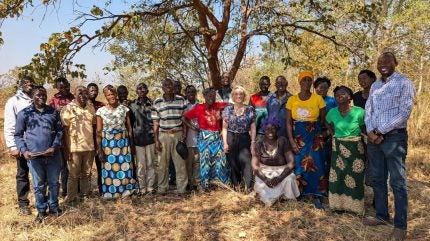
Aid by Trade Foundation (AbTF) held group discussions with CmiA farmers in Zambia to examine where they are seeing ecological changes and what measures they are taking in response.
The group of CmiA small-scale farmers consisted of 46% men and 54% women, with 66% having lived in the region since birth, and 34% for 10 to 20 years.
“The discussions focussed on addressing challenges and solutions together with farmers in Zambia,” said Nina Schöttle, AbTF’s project manager for monitoring and evaluation. She explained that the foundation’s key goals include stopping biodiversity loss and increasing the resilience of African small-scale farmers through comprehensive, locally driven measures.
According to the survey, rural Africa has seen a decline in biodiversity, while deforestation, poaching, and the expansion of settlements have “severely” affected many wild animals, even leading to the extinction of some species, and fuelled many conflicts between humans and wildlife.
A water shortage in local rivers was also identified as a pressing issue.
AbTF highlighted that in the discussion group, farmers described the signs of these ecological shifts in their environments, including the lack of certain fungi in forests indicating reduced biodiversity, changes in soil structure and colour signalling poorer soil quality, and the proliferation of certain weeds, such as witchweed and ragwort, an indication of changes in the biological balance.
They also noted fluctuating temperatures and irregular rainfall patterns, which have reportedly disrupted local farming cycles.
AbTF emphasised the impact of biodiversity decline on the fields, stating that soil fertility has worsened, resulting in lower yields: “In the past, good results could be achieved without fertilisers, but today this is more challenging. Bush fires and the use of herbicides have reduced the presence of useful soil organisms such as earthworms, which help to break down organic material.”
Measures undertaken to promote biodiversity
AbTF noted that the group discussions with small-scale farmers made it clear that the way cotton fields are managed has a “significant” impact on soil health and biodiversity in their surroundings.
The foundation explained that to promote biodiversity, farmers have adopted practices like crop rotation and integrated pest management while minimising chemical pesticides and herbicides in favour of organic alternatives. They also avoid tilling the soil to preserve its quality, using compost and organic fertilisers such as cow manure to enhance it.
AbTF pointed out that these sustainable agricultural practices align with the principles of the CmiA standard, which has long emphasised climate and environmental protection. The organisation regularly shares these practices with small-scale farmers through training programmes, aiming to boost their resilience against climate change and improve their livelihoods in the long run.
Recently, AbTF’s annual report on the verification and implementation of CmiA suggested positive progress has been made since 2022.



